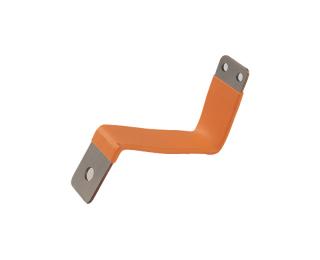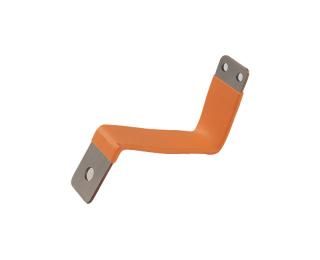

A Copper Battery Bus Bar is a critical component in electrical and battery systems, designed to facilitate efficient power distribution by connecting multiple battery cells or modules. Made from high-conductivity copper, these bus bars minimize energy loss, ensure stable current flow, and improve the overall efficiency of applications such as energy storage systems (ESS), electric vehicles (EVs), and industrial power solutions.
As a trusted Bus Bar Manufacturer, we specialize in producing battery busbar copper and Flexible Copper Busbar solutions that meet the demands of high-current, high-reliability applications.

To achieve high precision and quality, Copper Battery Bus Bars undergo a meticulous manufacturing process:
Material Selection
High-purity C1100 copper or oxygen-free copper is chosen for its excellent electrical and thermal conductivity.
Cutting & Shaping
Advanced CNC machining, stamping, or laser cutting ensures precise dimensions for specific battery pack configurations.
Surface Treatment
Copper bus bars undergo nickel plating, tin plating, or silver plating to enhance conductivity, corrosion resistance, and durability.
Insulation Coating (Optional)
PVC coating or heat-shrink wrapping provides electrical insulation, preventing short circuits in high-voltage applications.
Quality Inspection
Each batch undergoes rigorous testing, including conductivity tests, thermal resistance tests, and mechanical durability tests to ensure reliability in critical battery applications.
Superior Electrical Conductivity
Low resistance ensures efficient power transmission with minimal energy loss.
High Thermal Conductivity
Effectively dissipates heat, reducing the risk of overheating in high-current applications.
Corrosion Resistance
Plating options like nickel, tin, or silver protect against oxidation and extend service life.
Customizable Designs
Available in various sizes, thicknesses, and hole configurations to meet EV battery connection and industrial battery requirements.
Lightweight and Compact
Optimized for modern battery pack designs, ensuring efficient space utilization.
Eco-Friendly and Recyclable
Copper is a sustainable material, making it ideal for environmentally conscious energy solutions.
| Parameter | Details | Customization |
|---|---|---|
| Material | C1100 Copper / Oxygen-Free Copper | Yes |
| Plating Options | Nickel, Tin, Silver, or Bare Copper | Yes |
| Thickness Range | 0.2mm - 10mm | Yes |
| Length & Width | Customizable based on battery pack design | Yes |
| Insulation Coating | PVC, Heat Shrink Tubing, or None | Yes |
| Current Capacity | Suitable for low to high current applications | Yes |
| Applications | EVs, ESS, UPS, Solar Power Storage | Yes |
Electric Vehicles (EVs) & Hybrid Vehicles
Provides low-resistance electrical connections in lithium-ion battery packs.
Ensures stable current flow for optimal battery performance.
Assists in heat dissipation, preventing thermal buildup in high-power EV batteries.
Energy Storage Systems (ESS)
Used in solar and wind energy storage systems for efficient energy transmission.
Reduces energy loss and enhances battery pack reliability.
Suitable for grid-scale battery storage solutions requiring copper foil flexible busbar new energy power battery designs.
Uninterruptible Power Supply (UPS) Systems
Ensures consistent power supply during outages.
Supports high-power backup systems for data centers, hospitals, and industrial facilities.
Industrial Battery Packs
Applied in forklifts, heavy machinery, and telecom power backup systems.
Provides long-term durability and stable electrical performance in demanding environments.
Flexible Copper Busbar – absorbs vibration and compensates for installation tolerances.
Battery Terminals & Lugs – secure connection points for busbars.
Insulation Accessories – heat shrink tubing, gaskets, and coatings for safety.
Busbar Copper Ground Strap for Battery Pack – grounding solutions to prevent electrical faults.
Why choose copper bus bars over traditional wiring?
Copper bus bars offer lower electrical resistance, better heat dissipation, and compact design compared to traditional wiring, making them ideal for high-power applications
How to select the right copper bus bar for my battery system?
Consider current capacity, voltage requirements, plating options, and insulation needs. Custom sizes and configurations are available for battery flexible busbar copper connecter applications.
Can copper bus bars be customized?
Yes, they can be cut, bent, plated, and coated to meet the requirements of EVs, ESS, and industrial battery packs.
Do copper bus bars require insulation?
Depends on the system. High-voltage packs may require PVC or heat-shrink coatings for safety.
What’s the difference between nickel-plated and tin-plated bus bars?
Nickel-plated: Higher corrosion resistance and durability.
Tin-plated: Better solderability and cost-effective for assembly.
How to install a copper battery bus bar?
Ensure clean and secure connections, tighten fasteners to recommended torque, and apply insulation if necessary.
What is the lifespan of a copper bus bar?
With proper installation and plating, copper bus bars can last 10+ years.
Can copper bus bars operate in high-temperature environments?
Yes, copper’s excellent thermal conductivity ensures reliable operation even under high temperatures.